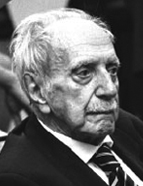

He was born in Queluz, in the state of São Paulo, in 1915 and died in São Paulo, the state capital, in 2003. His parents were teachers and his grandparents, on both sides, were farmers in Guaratinguetá (São Paulo) and Barra Mansa (state of Rio de Janeiro), which made him deeply identified with the region of the Paraíba do Sul River, an important coffee-growing area during the Empire. He attended primary school in several towns in the valley and secondary school at a traditional school in Guaratinguetá. In 1932, he enrolled at the Faculdade de Direito do Largo de São Francisco [Largo de São Francisco Law School] (“Arcadas”) in São Paulo and, in 1934, in the History and Geography course at the Faculdade de Filosofia [School of Philosophy] of the then newly created University of São Paulo. At the former, he was a student of great jurists of the time, such as Waldemar Ferreira, a commercial lawyer and historian of law, and Almeida Junior. At the Faculdade de Filosofia [School of Philosophy], his teachers included Plinio Ayrosa, Afonso Taunay and the Frenchmen Pierre Monbeig and Fernand Braudel. Having also attended the Escola de Professores do Instituto de Educação [Teachers’ School of the Institute of Education], he became a tenured education professor at the Normal School through competitive examination. He later taught at other secondary schools in the capital and at the Faculdade de Filosofia da USAP [School of Philosophy] of the Catholic University of São Paulo. He then joined the Faculdade de Filosofia [School of Philosophy] at USP, appointed as assistant professor by Fernand Braudel. After a brief period as a professor of Ancient and Medieval History, he settled on Modern and Contemporary History, where he was also assistant to the specialist in the Reformation, Émile Leonard. In 1946, he completed his doctorate, consolidating his academic position at USP, and in 1951, he was promoted to professor of Modern and Contemporary History.
This work is financed by national funds through FCT - Foundation for Science and Technology, I.P, in the scope of the projects UIDB/04311/2020 and UIDP/04311/2020.
